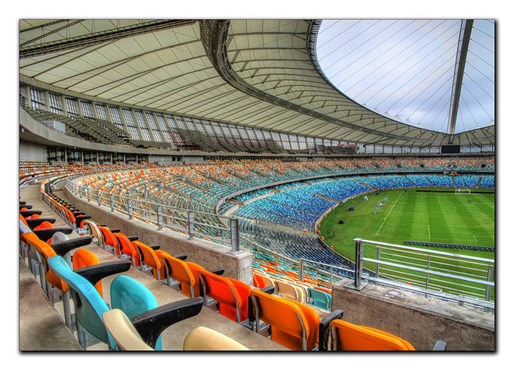World Cup stadia: White elephants or golden opportunities?

The Moses Mabhida Stadium in Durban. One of the new stadia constructed for the 2010 World Cup. Photo (c) flickr user smee.bruce and licensed under a Creative Commons 2.0 licence.
31.08.2010
By Miko SchneiderMuch has already been written in the international press about the various issues clouding the 2010 World Cup stadia’s construction, including delays, corruption within local councils, eviction of residents or informal traders from some of the building sites, clashes between local government’s and FIFA’s preferences for location (especially with regard to the Green Point Stadium), demolition of important community buildings with poor planning for their relocation (such as the local primary and high school in Nelspruit), the short term, unskilled nature of the construction jobs created, and the fact that stadia far away from disadvantaged communities re-raise questions of access to community-building facilities.
However, the phrase on nearly everyone’s lips seems to be ‘white elephant’; and the major question is whether these stadia, especially those in low-density populations, will ever again justify the funds expended on them?
Flexible designs
Granted, the seating arrangements of stadia in Cape Town and Durban were designed to be scaled down for smaller events such as local soccer matches and concerts, or scaled up for larger events - both Durban and Cape Town have been mentioned as potential hosts of the Olympic Games in 2020 – but who knows what additional resources will need to be redirected from public services to the construction for the Olympic Games, and at what cost to the poor and in-need?
This past weekend’s double bill South African ABSA Premiership opening matches at the Cape Town Stadium was an attempt to re-create the spirit of the World Cup - the Cape Town fan walk was open, and capacity reached a full house of 45,000. However, the Premiership match at the Moses Mabhida Stadium in Durban on Sunday was described as ‘largely deserted’ by the South African Press Association.
Stadia not suitable for rugby or cricket
Another significant loss for the stadia comes in the form of cricket and rugby clubs, who were envisioned to take over the use of the stadia for local and international matches.
However, an article in South African newspaper The Star on 21 August reported that governing bodies SA Rugby and Cricket SA will not be able to use the stadia as intended, because in many cases the pitches or the facilities (such as VIP boxes) were insufficient.
These stadia relied heavily on funding from cricket and rugby clubs to cover their multimillion maintenance fees, but Cricket SA chief executive Gerald Majola described the communication breakdown as a ‘failure of cities to consult [cricket and rugby] authorities before construction got under way’.
Local architect: Disassemble and re-use stadia components
There have been some novel suggestions from South Africans for the future of the World Cup stadia. In a letter to the Cape Times, local architect Jonathan Basckin describes his idea for the disassembling of the Cape Town Stadium and reusing its parts.
“The troublesome and much attended-to fabric could be sold back to the suppliers, the 60000 plastic seats containerised and sold anywhere in the world, the sanitary fittings shipped off no further than [the informal township of Gugulethu]… The vast prefab structural elements I am sure could find a use in a rather novel housing scheme and the remaining land and urban furniture (walkways, parks etc) could be left in situ for enormous amenity and little cost”, Basckin writes.
On the other hand, Archbishop Desmond Tutu believes that – whether or not the World Cup costs will be offset by promised ‘soft’ earnings such as increased tourism, foreign investment, and a sparkling national reputation – the stadia and facilities now offered by South Africa has placed the country firmly on the map of world sport. He says, “With all of the many negative things that are taking place in Africa, this is a superb moment for us. If we are going to have white elephants, so be it.”
Five new stadia were constructed for the tournament: the Cape Town Stadium, also known as the Green Point Stadium, has a capacity of 55,000-64,000 seats, hosted 8 World Cup matches, at a cost of €470m. The Moses Mabhida Stadium in Durban, which hosted 7 World Cup matches and has a capacity of 54,000-80,000, cost €363m.
There are also the Nelson Mandela Bay Stadium in Port Elizabeth (49,000 seats, hosted 8 World Cup matches, €214m), the Mbolela stadium in Nelspruit (41,000, 4 World Cup matches, €112,000) and, finally, the Peter Mokaba Stadium in Polokwane (42,000, 4 World Cup matches, €133m).
In addition, Soccer City Stadium in Soweto – called "the Calabash" due to its resemblance to the African pot, and the site for the opening ceremony, opening match and the final – underwent a major upgrade to reach 95,000 seats, making it larger than the International Stadium Yokohama, Stade de France, and Olympiastadion Berlin.
Ellis Park, Loftus Versveld, Free State and Royal Mafikeng stadia also underwent minor refurbishments.





